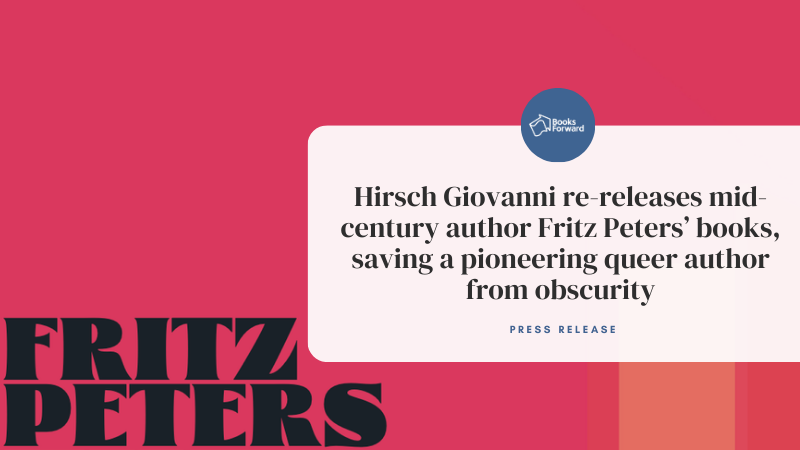LOS ANGELES, CA – Hailed as “an undiscovered LGBTQ classic” (Matt Donnelly, Variety), Fritz Peters’ 1951 novel “Finistère” is getting a worldwide re-release in June 2024 from publishers Hirsch Giovanni. Despite being a bestseller in its time with over 350,000 copies sold, “Finistère” has largely fallen out of public consciousness. A pioneering work of queer literature, “Finistère” was one of the first to depict the tragedy of gay life as rooted in society’s rejection and misunderstanding of the Other rather than in the perceived immoral behavior of its protagonist.
In addition to being a trailblazing queer author, Fritz Peters was also acclaimed for his frank depiction of trauma relating to WWII military service and the medical response to treating PTSD in his 1949 book, “The World Next Door.”
In order to give Fritz Peters the recognition he deserves, Hirsch Giovanni is re-publishing five of his most revered literary works as well as working with director William Gazecki to develop a documentary centered on Fritz’s life and work.
“Fritz was a renowned writer who deserves to be known… his books are transcendent works of literature with unforgettable, sensitively rendered characters from riveting times and places.”
– Alexandra Carbone, Managing Editor for Hirsch Giovanni’s Fritz Peters’ Collection
The Complete Fritz Peters Collection…
“The World Next Door”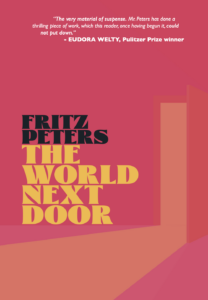
Fritz Peters | June 4, 2024 | Hirsch Giovanni | Literary Fiction
Paperback | ISBN: 978-1-957241-12-8
Ebook | ISBN: 978-1-957241-13-5
Originally published in 1949, “The World Next Door” is a stream of consciousness account of a psychotic break from the perspective of a WWII veteran.
“Mr. Peters has done a thrilling piece of work, which this reader, once having begun it, could not put down.” –Eudora Welty, Pulitzer Prize winner
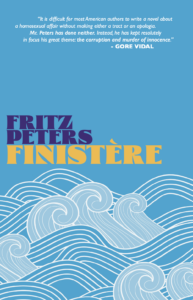 “Finistère”
“Finistère”
Fritz Peters | June 4, 2024 | Hirsch Giovanni | Literary Fiction
Paperback | ISBN: 978-1-957241-08-1
Ebook | ISBN: 978-1-957241-09-8
Originally published in 1951, “Finistère” is Fritz Peters’ LGBTQ masterpiece. The book follows a young man who falls in love with his teacher.
“The Descent”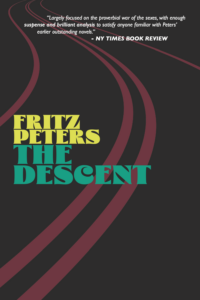
Fritz Peters | June 4, 2024 | Hirsch Giovanni | Literary Fiction
Paperback | ISBN: 978-1-957241-06-7
Ebook | ISBN: 978-1-957241-07-4
Originally published in 1952, “The Descent” is a vivid look at post-WWII America with observations on the battle of the sexes.
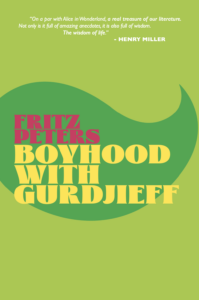 “Boyhood With Gurdjieff”
“Boyhood With Gurdjieff”
Fritz Peters | June 4, 2024 | Hirsch Giovanni | Nonfiction, Memoir
Paperback | ISBN: 978-1-957241-04-3
Ebook | ISBN: 978-1-957241-05-0
Originally published in 1964, “Boyhood” explores Fritz’s relationship with the guru Gurdjieff during his troubled formative years.
“A real treasure… Not only is it full of amazing anecdotes, it is also full of wisdom. The wisdom of life.” –Henry Miller
“Gurdjieff Remembered”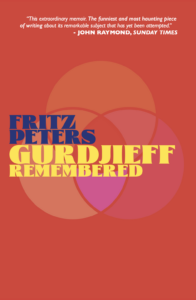
Fritz Peters | June 4, 2024 | Hirsch Giovanni | Nonfiction, Memoir
Paperback | ISBN: 978-1-957241-10-4
Ebook | ISBN: 978-1-957241-11-1
Originally published in 1971, “Gurdjieff Remembered” is a sequel to “Boyhood” taking place shortly after WWII.
Meet the Hirsch Giovanni team…
CHRISTOPHER ADAMS is a British-American playwright and screenwriter based in the UK. His plays include Cooked (Bread & Roses Theatre, 2015), Antigone (Actors of Dionysus, 2017), and Tumulus (VAULT, 2018 | Soho Theatre, 2019). He currently has a television project in development with FilmNation and a film project in development with Hirsch Giovanni.
Christopher was a member of the Royal Court Theatre’s Young Writers Programme (2011) and Studio Writers Group (2013), the Arcola Theatre’s writing group (2015), and the Orange Tree Collective (2015-2016). His full-length and short plays have been performed in London, Birmingham, Dublin, and Shanghai. His plays Lynchburg (2013) and Haunts (2015) were long-listed for the Bruntwood Prize.
In his academic life, Christopher holds a PhD in mid-twentieth century queer publishing history from the Institute of English Studies, University of London. He is a co-editor of The Collected Works of John Ford: Volumes II & III (OUP). He teaches on the ‘Introduction to the Principles of Descriptive Bibliography’ course at Rare Book School (University of Virginia), and has written on John Ford for the Globe Theatre. He is a U.S. Fulbright Scholar.
ALEXANDRA CARBONE is a graduate of Haverford College. She is Creative Executive at Hirsch Giovanni Entertainment, where she is documentarian for Unapologetically Fritz, and managing editor for the Fritz Peters Collection.
Follow Hirsch Giovanni online:
Web: www.hirschgiovanni.com | Instagram: @hirschgiovanni
In an interview, managing editor Alexandra Carbone can discuss:
- The art of re-releasing classic books for a contemporary audience
- The strides that Fritz Peters made as an early pioneer of queer literature
- How PTSD influenced Fritz’s life and what revelations he made about mental illness in his books
- Who Gurdjieff was, what he believed, and why he was so influential to Fritz
- The process of creating a documentary centered around Fritz’s life and what has been most surprising to learn thus far
An Interview with
Alexandra Carbone
1. What drew you to Fritz’s work, and why do you think his books will resonate with contemporary readers?
Fritz was a remarkable writer with a perceptive, authentic voice. Between his life experiences in WW2, childhood spent in the lap of spiritual and literary visionaries, struggles with mental illness, and identity as a queer writer, he has a unique perspective that he communicated with a remarkable clarity and depth. The characters in his books, from a troubled WW2 veteran locked in a VA mental ward, to a dangerously misunderstood gay teen in 1920s France, to himself, as a boy, being raised by his mentor Gurdjieff, are profoundly and touchingly presented. It is compelling literature that did not make it into the canon, and we are rectifying that.
2. What strides did Fritz make as a gay writer publishing books pre-Stonewall?
Fritz wrote “Finistère,” a gay bestseller in 1951. It was remarkable in its unapologetic portrayal of a gay teen driven to drastic acts by a family and society who judged and discriminated against him. It frankly asks how someone discovering their homosexuality can come-of-age in a society that has no place for a gay adult to love, or even freely exist. It’s a remarkable novel that happens to be a gay novel. As such, it spoke both to gay readers of the time, who had little access to such material, and for gay people of the time, who were often judged as perverse or ill. It is a highly personal and sensitive account, vulnerable and profound.
3. Can you tell us about Gurdjieff, who he was, and why he was so influential to Fritz?
Gurdjieff was a renowned guru and spiritual leader, who believed that if the east and west did not learn from each other, humanity would destroy itself. Born in Armenia in 1866, his life spanned till the mid 20th century, in which time he studied with many different esoteric groups throughout the middle east and Tibet. When Fritz’s parents divorced and his mother had a nervous breakdown in the early 1920s, he and his brother Tom were sent to Gurdjieff’s school in Fontainebleau France, by his aunt Margaret Anderson and her lover Jane Heap. They were publishers of The Little Review, in Gertrude Stein’s salon circle, and Gurdjieff followers. Fritz’s stay there is the subject of his book, “Boyhood with Gurdjieff.” Gurdjieff’s school was not a boarding school for children, it was more of a spiritual community, and Fritz, with his interest in psychology and human behavior, became Gurdjieff’s assistant, cleaning his room and helping care for him after an illness. Gurdjieff became a father figure for Fritz, and he was raised so closely by him at such a sensitive time that the lessons and philosophy he taught him, in a very hands-on way, would resonate for the rest of Fritz’s life and in his writing. Gurdjieff also, mischievously, named Fritz his “True Son” and rightful heir to his wisdom. This gave Fritz a certain contested, controversial status in the community–a mantle that Fritz struggled with for the rest of his life.
4. How did WWII affect Fritz, and what important revelations about PTSD and mental illness did he make in his books?
Fritz was a sensitive youth anyway, and spending time in enemy fire highly traumatized him. As he recounts in “Gurdjieff Remembered,” this was mainly because he had a few experiences where he was the only one who survived a strafing or bombing. He was drafted in the last few years of the war, and when he got out went almost straight into a VA hospital in the midst of a psychotic break. This experience was the subject of his first novel, “The World Next Door.” This book is remarkable for its stream-of-consciousness style, written from the point of view of a severely mentally ill patient. As such, many in the medical field found it a useful book, to be able to see things from a patient’s perspective. He also subscribes to the school of “a breakdown is a breakthrough” and feels that he gained some wisdom from experiencing that fractured state.
5. What is the documentary process like, and what have you learned so far?
We have interviewed people who knew Fritz and experts who were fans of his work. We have learned intimate details about his character and background, and have validated the assertion that his work was all highly autobiographical. Fritz’s life and work are highly intertwined, lending his writing the validity and freshness of truth. It’s also been sad but interesting to learn how he ultimately succumbed to his demons, essentially drinking himself to death, despite providing us with some impeccable writing especially when he was younger. The volatility in his youth – which included some shocking instances of abandonment, physical abuse, and even incest – surely account for this sad outcome, setting him up with obstacles he would only ever temporarily overcome. Fritz was somehow more human than most people, in every sense, in his strengths and weaknesses, powers and failings.

A former award-winning journalist with national exposure, Marissa now oversees the day-to-day operation of the Books Forward author branding and book marketing firm, along with our indie publishing support sister company Books Fluent.
Born and bred in Louisiana, currently living in New Orleans, she has lived and developed a strong base for our company and authors in Chicago and Nashville. Her journalism work has appeared in USA Today, National Geographic and other major publications. She is now interviewed by media on best practices for book marketing.
